RIM BANNA / “Voice of Palestine Mixtape”
PALESTINE: Issue, Voice, Music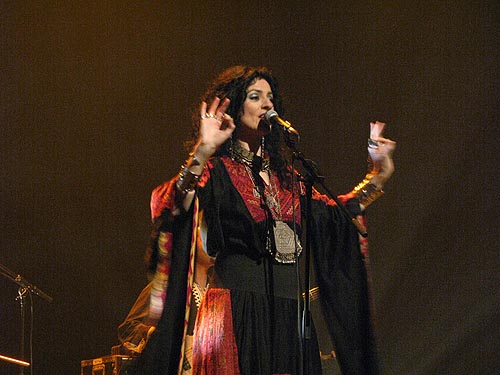
1. The Issue
I was born in 1947.
The present state of Israel was born in 1948.
Culturally, during the first fifteen years of my life I was reared as a Christian, which in the United States means I was taught to identify with the Jews who were oppressed by “old Pharoah” in ancient times and by “evil Hitler” in modern times. How many of our gospel songs have Jewish references?
I came of age during the Civil Rights movement. Many of our major supporters and indeed a significant number of the leaders in the Civil Rights movement were Jewish.
During the Black Power era many of us decried Zionism but the ideals of one’s youth are not easy to erase. Most non-Muslim, African Americans either subconsciously or overtly identify with Israel.
In the seventies I was a delegate to the sixth Pan African Congress in Dar es Salaam, Tanzania. I touched the boulders in the Indian Ocean that had iron stakes driven into them. Our Arab enslaved ancestors were chained to these boulders at low tide awaiting the dhows to whisk them away to slavery in the Orient, from Yemen to as far away as China, but mostly in the area now known as the Middle East.
I had read Chancellor Williams important history book, The Destruction of Black Civilization. I had also read Two Thousand Seasons, Ayi Kwei Armah’s expose of how both Arab and European slavery decimated Africa. And, of course, I have corresponded with our Sudanese sister Kola Boof, who is fierce in her defense of Israel and her rejection of Islamic oppression and exploitation.
I am a political realist. Arab theocracies and dictatorship are as big an impediment to the realization of Palestine as is the state of Israel. There is nothing progressive about fundamentalist-oriented, organized religion of whatever stripe (Christian, Muslim, Jewish or whatever).
Furthermore, I am clear that many Muslim organizations and regimes are absolutely committed to eliminating Israel and that Jews in general feel (and sometimes are) besieged and also feel (and too often are) friendless in a centuries old life of rejection by most other people. I fully understand and empathize with Jewish longing for their own homeland. I intimately know the feeling. We still ain't got our forty acres, not to mention our own nation!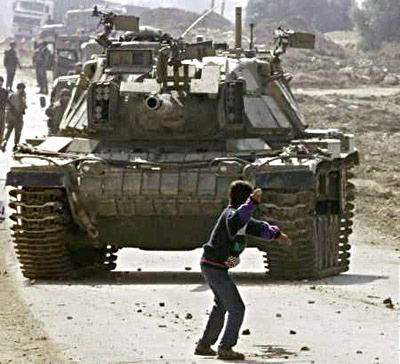
My general view is that Israel is a Middle Eastern, military enforced solution to a European problem. The holocaust didn't happen in the Middle East. Why wasn’t a portion of Germany, or maybe what is now Austria, offered for a Jewish homeland? The simple answer is because at the end of World War 2 the European powers, with Britain in the lead (which position is now taken by the USA), decided otherwise. Today, most people see the problem as Jew against Arab and vice versa, without seeing the root cause of the conflict as Euro-American imperialism.
I support the obvious rights of Jews to live without persecution and I also support Palestine including the right to return. In the current situation my support of Palestine is straight up but I am also aware that there are major contradictions. As painful as it sometimes is to work through contradictions, contradictions are the essence of life.
Paradoxically, the current struggle to actualize the state of Palestine was also born in 1948 when the nascent Zionist state expelled people from the land where families had lived for generations. Today some people who were born in areas that are now considered part of Israel, or bornin lands that are under Israeli control, can not return to their homeland although European Jews who have not ever lived in those areas are welcomed to repatriate—how people can “re”patriate to some place where they were never “in”patriated in the first place is a mystery of modern politics.
I don’t claim to know how all of this will play out. What I do know is that in 20 years or so, I will be dead. Living longer is a possibility, but not much of a probability.
In 20 years or so, Israel as we know it today will also be nearing its end. Living longer…
What will end Israel will not necessarily be war; population numbers are against longevity for a state in which the non-Arab population is not significantly increasing whereas demographers project that the Israeli Arab and the Palestinian population will double in a 20 year period. Even if Israel exists, it will not be able to do so as a “one person – one vote” democracy.
I accept mortality.
I do not look forward to death but I do not fear the future.
Global capitalism is collapsing. Dictatorships and old democracies are in danger right and left. A fiercer truth is that the environment will force change. The world can not support another America, and make no mistake America is the world standard for modern living.
Many of us are upstanding citizens of a humongous country called “Denial.’ Some of us even marshal evidence to prove to ourselves that the environment is not threatened, that we can military win all the wars and rebellions happening around the globe, that non-Christian religions can (and should) be contained, if not out and out suppressed. Our stupidity seems endless.
But in 20 years or so…
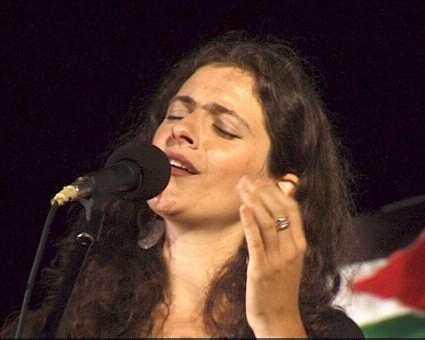
2. The Voice of Palestine
"A part of our work consists of collecting traditional Palestinian texts without melodies. So that the texts do not get lost, we try to compose melodies for them that are modern, yet inspired by traditional Palestinian music."
—Rim Banna
I want to share some music from an artist who was born (December 8, 1966) in Nazareth, yes, that Nazareth, the land in the Galilee region where Christ was born. Rim Banna is a Palestinian vocalist and composer.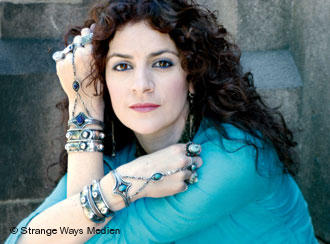
For Ms. Banna, being Palestian is not simply a matter of ethnicity in the sense that she was born an Arab—she is Palestinian because of her commitment to preserving and propagating Palestinian culture and because of her open identification with the Palestinian struggles on a political and economic level. In other words she doesn’t simply sing a handful of traditional songs. Rim Banna consciously asserts her identity and her support of Palestinian rights. 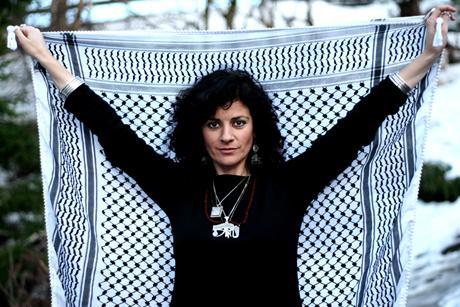
Her Palestinian identity is based on her cultural practice and her conscious identification with and participation in social struggles. For example when she performs, she often wears the keffiyeh, the traditional Palestinian scarf. Her modernization does not include a liquidation of the Arabic language even though the pathway to international success in the entertainment field generally includes recording in one of four major European languages (English, Portuguese, Spanish or French). Rim Banna’s mission is to promote Palestine and the acceptance of Palestinian culture, which necessarily includes the Arabic language.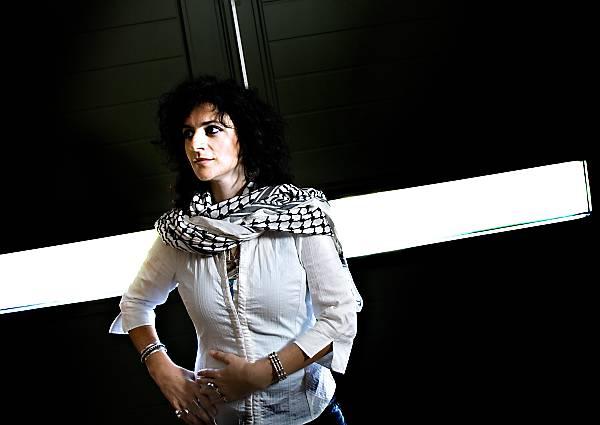
Her background is full of the twists common to oppressed peoples. She was educated outside of her home community. She is a stalwart Palestinian but she generally works in cross cultural contexts. Her band is mostly Norwegian. Her musician husband (mainly acoustic guitar) is from the Ukraine. Her music is sung in Arabic but the instrumentation and song-structures are what some would call “western”—actually her music is strongly influenced by jazz and contemporary popular music (which we all know is rooted in black music). But all of her “world” connections notwithstanding, Rim Banna is widely recognized as the voice of Palestine.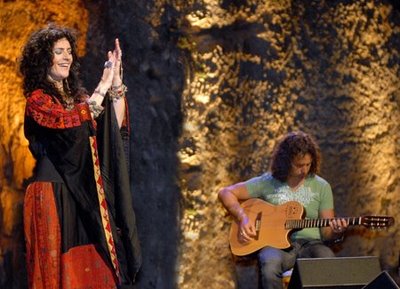
After six years of study, Rim graduated in 1991 from the High Institute for Music “Gnesins” in Moscow where she focused on modern singing and conducting singing ensembles. She met her husband Leonid Alexeienko while in school.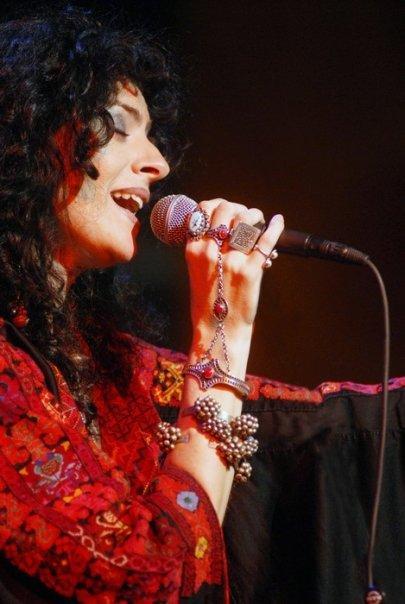
Rim Banna has systematically studied and collected songs (particularly children’s songs), traditional stories and texts, and ancient songs. She has modernized the traditional music and has also added Palestinian elements to other music. Rim is famous for her repertoire of Palestinian children’s songs (lullabies/cradle songs) that she performs as part of her concert presentations.
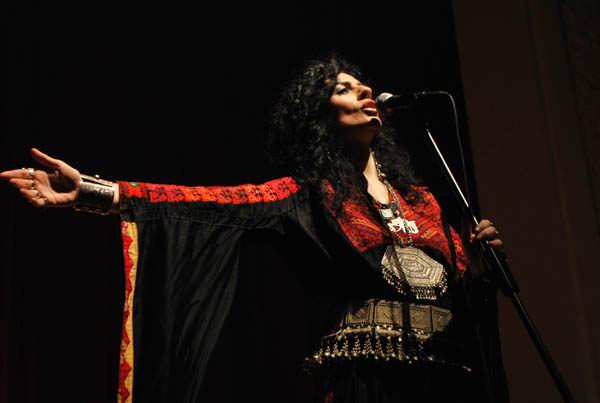
3. Rim Banna Music
Banna has ten albums.
* Jafra (1985)
* Your Tears Mother (1986)
* The Dream (1993)
* Qamar Abu Leileh (1995)
* Mukagha (1996)
* Al Quds Everlasting (2002)
* Krybberom (2003), Rim Banna & SKRUK
* Mirrors of My Soul (2005)
* This Was Not My Story (2006), Rim Banna & Henrik Koitz
* Seasons of violet (2007)
Rim is also featured on a famous compilation, Lullabies from the Axis of Evil (2003 - Various female artists)
All the selections in the mixtape are from her four albums. These recent albums are not only widely available, they are also musically excellent.
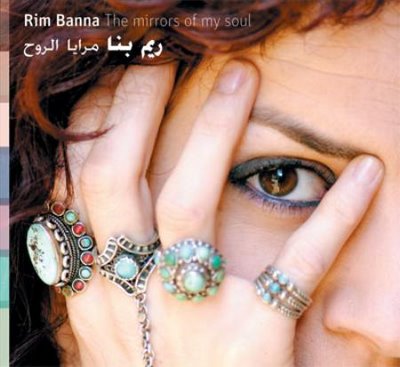
Mirrors Of My Soul is Rim’s best selling album and features her Norwegian band: Gjermund Silset (bass), David Wallumrød (keyboards), Rune Arnesen (drums) and Eivind Aarset (guitar), Leonid Alexeienko (acoustic guitar and arrangements).
The selections from Mirrors Of My Soul are:
1. “The Mirrors Of My Soul”
2. “Sarah”
3. “The Voice, The Fragrance and The Figure”
I don’t have all the translations but will list two of them below so you can get the flavor of her work. The translations are from the Arabic Song Lyrics and Translation website.
Rim Banna - "Sarah"
Sarah Sarai was taking her first steps on the soil of Palestine
And her laugh was covering, covering the sky of Palestine
The sniper took her by surprise with a shot in the head, in Sarah's little head
Take the blindfold off of Sarah's eyes so she can see the face of her killer
Rim Banna - The Voice, the Scent, and the Form
Oh root of my roots, I will surely return, so wait for me
Wait for me in the cracks of the rocks and the thorns
In the olive blossoms, in the color of the butterflies
And in the echo and the shadows in the mud of the winter
And in the dust of summer in the tracks of the gazelle
And in the wings of every bird
The thorns of the storm are in my path
And the call of the land is victorious in my veins
I am coming back, so keep my voice, my scent, and my form for me, oh flowers
Mirrors Of My Soul is an audiophile’s dream. The recording quality is off the charts. Great care went into the recording and mastering process. The technical attention mirrors the political attention Rim Banna invests in her music. As always with Rim Banna’s work, the message is straight up in support of Palestine, culturally and politically. The CD includes a book with translations of the songs.
The dedication of The Mirrors Of My Soul reads: “This album is dedicated to all the Palestinian and Arab detainees in the Israeli prisons, to honour of their struggle for freedom and independence.”
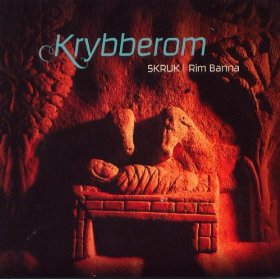
The selections from Krybberom (A Lowly Manager) are:
4. "Pa Himlen Over Stallen"
5. "Stille Natt (Silent Night)"
6. "Mitt Hjerte Alltid Vanker"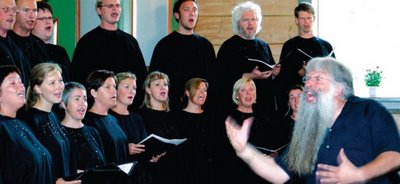
This album is a collaboration with SKRUK (Norwegian art ensemble), a choral group and the songs focus on nativity (birth), and features Christmas related material. There are three elements: the choir (Per Oddvar Hildre – director), Rim’s Arabic singing, and a jazz trio (Tord Gustavsen – piano and arrangements; Mats Eilerstsen – bass; Kenneth Ekornes – percussion). On paper it probably does not sound like a promising combination but it works beautifully, no matter which of the three is your main point of interest/entrance.
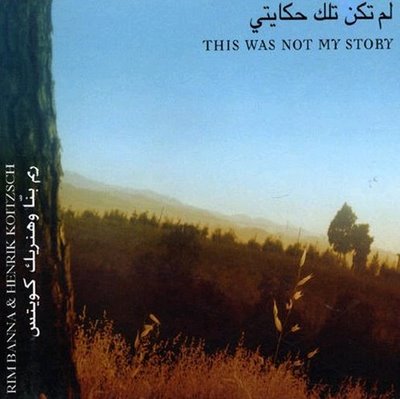
The selections from This Was Not My Story are:
7. “Wait For Me”
8. “She”
9. “Defend The Freedom”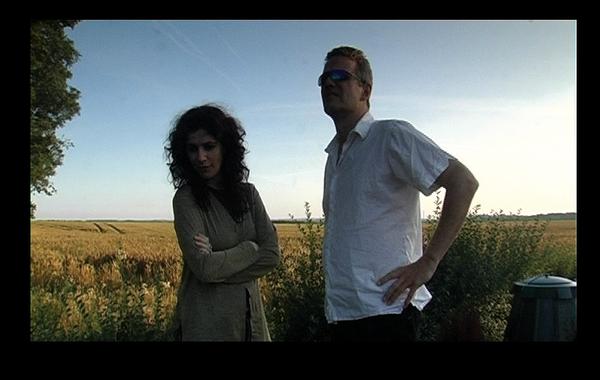
This album is a collaboration with Danish composer Henrik Koitz. electronic elements are added to Rim's music which previously had been all acoustic.
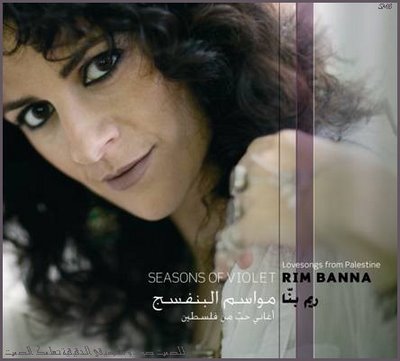
The selections from Seasons of Violet – Lovesongs from Palestine are:
10. “The Night Has Fallen Down”
11. “The First Rain”
12. “The Weeping Of The Rose”
This is Rim’s latest album and it is stunning in that it is love songs that are not sentimental in a mushy, “goo-goo for you” way but rather these are songs that express the strong desire for union, for the consummation of love, and in the process foregrounds the background context of separation, exile, political struggle.
All of the music is by Rim and her husband Leonid, some of the lyrics are by Rim’s mother, some are by Rim, and others are by noted Palestinian and Arab poets. BTW, the violet flower signifies “love” in Palestinian culture.
Rim has the beautiful ability to make a language that is harsh (to my ears) sound supple and soft. Much like my initial response to Joy Denalane singing in German, Rim Banna's voice is actually soothing regardless of the sharpness of the raw sound.
Part of the secret is a quality Rim shares with Nat King Cole; it's all in her enunciation, which is clear and precise even as she is singing. There are no slurs, nor abridging of words or syllables. Rim's recordings could be used to teach and/or learn Arabic.
At the same time that there is great artistry on a technical level, Rim also deposits a rich, rich emotional investment that pays off in producing music that connects even though we may be culturally separate. This is music that touches us emotionally even if we do not share her political stances.
There is no feeling of posturing or putting on in Rim's voice. Regardless of whether I agree or am skeptical about the cause, I believe Rim is sincere and her sincerity provides a moment of human contact. The utter honesty about the contradictions and flaws allows me to see me in her, to identify aspects of my own social reality in her articulations about her reality. After all most of us have something or someone we long for, something or someone with whom authority figures prevent us from unifying.
The struggle for unity is a worldwide struggle. The push to make us believe that we can pursue and achieve happiness as an individual is a basic tenet of global capitalism. Our heartbeat is the drumbeat of revolution, the music we march to as we seek to get it together.
If you think about what Rim Banna has accomplished, you will see that her arms are wide open. She is meeting the world more than half way even as she stands strong in the convictions of her culture. She is a folk music based artist who has recorded with electronic composers. Rim is an Arab-identified artist who has recorded with non-Arabs. A Palestinian who has recorded with Jews. A Muslim who has recorded Christmas music. An Arab nationalist who has married a European.
The example of her music documents that she believes in all human beings. The example of her cultural commitment documents that she believes in the worth of her birthright. What more can be asked of anyone other than that they love others and love themselves?
“Let me say, at the risk of seeming ridiculous, that the true revolutionary is guided by great feelings of love.”
—Ernesto "Che" Guevara
Welcome to Palestine—Defend the Freedom to Love.
—Kalamu ya Salaam
This entry was posted on Monday, March 2nd, 2009 at 6:45 pm and is filed under Contemporary. You can follow any responses to this entry through the RSS 2.0 feed. You can leave a response, or trackback from your own site.
2 Responses to “RIM BANNA / “Voice of Palestine Mixtape””
March 7th, 2009 at 9:04 pm
I’m always very happy to listen to the songs uploaded by Breath of Life. Your written introduction is moving and thoughtful, and now I’m listening to the song and it’s also gorgeous and moving, and makes me want to talk as well: My mother was born in 1949. She was born in Setif, Algeria. She is Jewish. She does not live in Algeria anymore. Sometimes she talks to me about her childhood memory, and find them very moving. I wish i could see this country of my mother. Neither I, nor she can. My mother now lives in France, like I do. But her sister and her brother, they live in Israel now. Are they European Jews? They’re not the only Mizrahi and Sephardic Jews who come fromArabo-Muslim world who now live in Israel. You’re absolutely right that there’s a lot of colonisation issues in the current conflict bewteen Israel and Palestinians (and there is a lot, too, in what happened to the Algerian Jews, and why they don’t live in Algeria anymore). But that’s not all there is. The holocaust didn’t happen in the Middle east, you’re right. But things did happen in the Middle east. Jews were treated as dhimmis in the Middle East. Jews were ghettoised, sometimes murdered without right to see justice, sometimes even slaughtered. Most of your post I loved and found their words moving, and I’m loving Rim Banna’s music which I am listening to, right now, I thank you for giving me the chance to listening to her; but I felt a little bit like you misrepresented those facts and the identity of my mother and her family; so I felt compelled to comment. I hope I am not offending by doing so. To end on something more musical, have you ever heard of Reinette L’Oranaise?
kalamu sez
thank you very much for your contribution to the conversation. everyone’s story is important. each story is an authentic part of the social reality. thank you also for adding another part to the complicated picture of the Jewish search for identity and the question of statehood. There are no easy answers but certainly listening to each other is part of the process of finding an answer.
i have not heard Reinette L’Oranaise but will check out her music. Thanks for the tip.
March 20th, 2010 at 7:55 am
Hello,
As an Algerian born man i want to add comment to your post but before to respond to the comment from l’etrangere.
Algerian jews were not expelled because they were jews, they lived Algeria because they identified themselves as french.
Colonialism rule always with “divide to reign” .
Algerians jews like Myriam ben lived in Algeria as Algerian all her life and was member of the ONM (moudjahideen national organisation) (the ancient freedom fighter organization).
The great lawer and freedom activist for Algeria & south africa and palestine, Nicole dreyfus (related to the famous officer Dreyfus) who past away a few weeks ago was honor citizen of Algeria. Henri Alleg too.
The central place of Algeria is named after the martyr Maurice Audin a communist jew .
About Africa I want to remind you that Algeria was called mecca of revolutionnaries by Amilcar Cabral because Algeria support african freedom fighters. Algeria in 1975 in the same time invite Yasser Arafat the leader of the palestinians in UN and leads the thirld word countries to expell the apartheid south africa out UN against US ,Europe and Israel.
I want to share with you the song Ifrikia (africa) sang by Myriam Makeba (she received the honor citizenship by the president Houari Boumediene himself in 1969).
This song is in Arabic of course 🙂
http://www.youtube.com/watch?v=Or6xN80xPlA
Leave a Reply
| top |